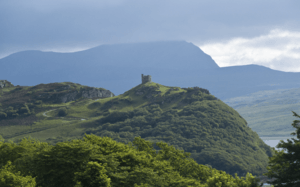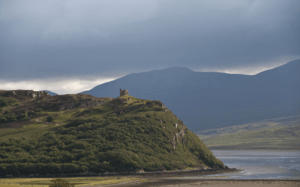Castle Varrich facts for kids
Castle Varrich (which is Caisteal Bharraich in Scottish Gaelic) is a cool old castle in the very north of the Scottish Highlands. It's close to a small village called Tongue. The castle sits high up on a rocky spot. From there, it looks over both the Kyle of Tongue (a sea inlet) and the village. No one knows exactly when Castle Varrich was built or how old it really is.
Contents
Discovering Castle Varrich's History
Castle Varrich was once the main home for the leader of the Clan Mackay. Some people think it might be more than 1,000 years old! There are even stories about caves under the castle where the Mackays might have lived a long time ago.
It's thought that the Mackay family built their castle around the 1300s. They might have built it right on top of an even older fort that belonged to the Norsemen (Vikings). This means the spot has been important for a very long time!
What Castle Varrich Looks Like
The walls of Castle Varrich are super thick, usually about 1.4 meters (or 4.5 feet) wide. They are built from strong, rough stone blocks. These blocks were put together without much mortar, which is like glue for stones. Even without mortar, the walls have held up really well against the weather, especially considering how old the castle might be!
If you look closely where parts of the walls have fallen, you can see that the whole wall is made of these strong stones. It's not just a fancy outside layer with rubble inside.
Inside the Castle Walls
Castle Varrich used to have two main floors and an attic. The ground floor might have been a stable for horses or other animals. You could get into it through a door on the north side. There were no stairs between the ground floor and the one above it. This makes people think the bottom floor was mostly for animals.
To get to the upper floor, you would have used a ladder or a removable set of stairs. The entrance was on the south side. This floor had a window on the east side and a fireplace on the west. Sadly, these parts have fallen apart over time.
Later on, the Clan Mackay chief moved their main home to a place called Tongue House. Castle Varrich is about an hour's walk from Tongue village, and there are clear signs to help you find it.
Amazing Views from the Castle
From Castle Varrich, you can see some amazing mountains. These include Ben Loyal and Ben Hope. The views are truly spectacular!
Recent Updates to the Castle
In 2017, some cool changes were made to Castle Varrich. A new metal spiral staircase and a viewing platform were added inside. This makes it easier for visitors to explore the castle and get an even better view over the Kyle of Tongue.
 | Percy Lavon Julian |
 | Katherine Johnson |
 | George Washington Carver |
 | Annie Easley |



